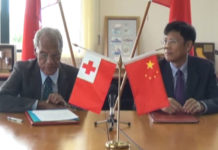Commentary:
A wise man once said that politics is the art of the possible.
In other words, a wise politician knows that he or she can do what is possible at the time with the resources available.
But in doing what is possible, the politician must also think about how his or her actions look to others.
When those actions – no matter how well intentioned – do not look good, then the government is in trouble.
As Kaniva News reported recently, Tonga’s cabinet ministers and department CEOs are feeling relaxed and positive after a retreat in Vava’u.
But will the feeling remain as the kingdom heads into the second half of the year?
The decision not to host the 2019 Pacific Games will continue to hover over the kingdom through the second half of the year.
And the way the decision was handled point to some major lessons that need to be learned if the government is to be returned to office at the next election.
Tonga now faces a major legal battle with the Pacific Games Committee over its decision to withdraw from the Games.
Prime Minister ‘Akilisi Pohiva may have been prudent in thinking that with the resources available and the long term costs of maintaining facilities, hosting the Games was not doable.
However, his action in terminating the government’s involvement has never looked good.
Apart from the legal problems, all of the country’s forward economic planning and the expectations of major donor nations like Australia and New Zealand were based on expenditure and income from the Games.
There is little sign yet that the government has revised its economic planning or made provision for not having the Games.
The long term effects of the decision on Tonga’s reputation also need to be considered.
No matter how real the Prime Minister’s concerns were, the decision not to host the Games should have been made at the beginning of the current government’s tenure when it could have been more easily explained away as a move to save the country from a bad decision by the previous government.
Instead, the move to abandon the Games looks like a snap decision made without consideration of reputational or long term interests.
Unfortunately, many of the decisions made by the Prime Minister and his government since they came to power have looked like they were made on the spur of the moment.
Too often they also seem to have been made without considering how they look to the outside world.
This is especially true of what looked like the flip-flopping of the decision on a casino application earlier this year.
Tonga expects more of the man who can truly claim to have brought democracy to Tonga and to have changed its political landscape.
Sadly, he has since parted company with some of his earlier supporters, who have become disillusioned with his behaviour since gaining power.
Hon. PÅhiva sometimes seems not to have understood that having spent years in opposition criticising the behaviour of the government, he would be held to a higher standard than anybody else when he became Prime Minister.
He must also have realised that to survive as Prime Minister he would have to grow thicker skin that anybody else and be able to shrug off criticism, attacks in the media and the jibes of his opponents.
He must also have realised that for a politician it is the look of the thing as much as the doing of it that matters.
Hon. PÅhiva and his government have made many positive changes in their time in office.
His government has begun to sort out the country’s economic problems and been praised by international bodies for introducing sound fiscal measures.
The democrats have cast off the long entrenched hold of the nobility in Parliament and made possible a transition to a more equitable political landscape.
Hon. Póhiva has achieved this without causing major social upheavals. He has, for instance, made it clear that he regards the monarchy as integral to Tongan society.
He has also worked hard to draw together the different strands of Tongan society and forged strong links with the Tongan diaspora, especially in New Zealand.
However, poverty, violence, drug trafficking, crime and levels of health care all remain concerns. The government is working on many of these issues and is using its ties with New Zealand and Australia to find solutions to unemployment through regional migration.
However, there are issues on which the government’s nerve has failed, as witness its decision not to ratify CEDAW.
The kingdom also inherited financial issues with China that will haunt it for decades unless they are resolved.
In politics the next election is only a heart beat away.
The Prime Minister and his cabinet emerged from their retreat on Vava’u refreshed and optimistic and ready to face the second half of 2017.
However, they will also have to face the fact that they must also face the prospect of an election, something for which no politician ever thinks there is enough time to prepare.
At that election the people will judge Hon. Pohiva and his government not just on what they have done, but – because the public is fickle and often thoughtless – on what they think they have seen him do,
If the Prime Minister does not learn to think a little more about how his actions might be seen, does not grow a little thicker skin and does not think more about the long term implications of his actions, then there is a danger that he and his government might lose the next election.
To hand power back to the entrenched power holders of former times would be unthinkable for Tonga.
It is up to the Prime Minister and his cabinet to draw some lessons from their first years in power to make sure they are re-elected and continue the democratic transformation of Tonga.







